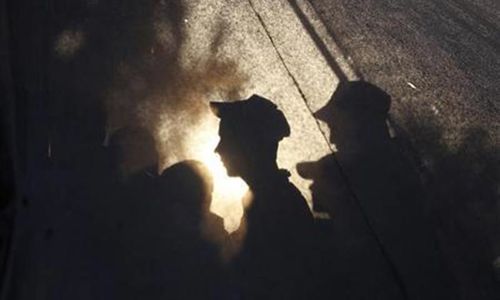Pakistan tells ICJ Jadhav confessed he’s Indian spy

UN’s top court says it will publicly deliver decision on whether to grant an emergency stay of execution ‘as soon as possible’
THE HAGUE: Pakistan on Monday told the UN’s top court that an Indian national arrested on its soil had confessed to having been sent by Delhi to “wage terror” on innocent civilians and its infrastructure after India attempted to save the life of Kulbhushan Jadhav.
Mohammad Faisal, from the foreign affairs ministry, said the tribunal had been shown a video of the confession which was available online “for viewers to decide for themselves whether commander Jadhav is confessing voluntarily”.
Mr Faisal also showed the International Court of Justice (ICJ) an image of a passport found in Jadhav’s possession bearing a different and Muslim name Hussein Mubarak Patel.
“India has been unable, or perhaps unwilling, to provide an explanation for this passport which is the most obvious indication of covert and illegal activity,” he said.
Mr Faisal told judges that instead of imposing emergency measures, they could schedule a hearing on the merits of the case within six weeks.
India has denied however Jadhav was a spy, and last week lodged a protest at the ICJ accusing Pakistan of “egregious violations of the Vienna convention”.
Jadhav was arrested in Balochistan in March 2016 and in April this year, a military court sentenced him to death. Pakistan has said the conviction and sentence remain open to appeal.
“India believes that the farcical nature of the proceedings and unjust trial by a Pakistan military court... has led to a serious miscarriage of justice,” said Deepak Mittal, an official at India’s external affairs ministry.
The case is likely to take months or years to resolve, so India is asking the ICJ immediately order Pakistan to “take all measures necessary” to prevent Jadhav’s execution pending the final outcome.
The court’s president already has written to Pakistan, urging it to take no action that could affect the hearing of the Indian request to prevent the death sentence.
Pakistani counsel Khawar Qureshi informed the court that India had concealed facts during the hearing in an attempt to secure the stay order against the death sentence awarded to Jadhav for carrying out subversive acts in Pakistan.
He said the court was not apprised that Jadhav was arrested in Balochistan and that he possessed double passports and birth certificates.
He argued that every country had undeniable right to punish the terrorists and the ICJ could not intervene in criminal cases.
Mr Qureshi said the Indian application for stay order was full of errors and distorted facts, besides hiding information and proofs shared with India on Jadhav’s arrest.
He termed the Indian claim that it was denied consular access baseless.
The counsel maintained the case related to the sovereignty of Pakistan and thus did not fall in the purview of the ICJ.
Pleading the court to reject the appeal, Khawar Qureshi said under the Vienna Convention, the jurisdiction of the ICJ was limited.
India claims Jadhav was kidnapped from Iran, where he was carrying on business after retiring from service.
But Khawar Qureshi shot back that Jadhav “is a terrorist” and New Delhi’s story was “far-fetched at best”.
“India invoked the jurisdiction of this court improperly,” he said. “This court exists to ensure that states engage in peaceful resolution of disputes. This court does not exist for time-wasting and political grandstanding.”
ICJ president Ronny Abraham said the tribunal would publicly deliver its decision on whether to grant an emergency stay of execution “as soon as possible”.
New Delhi ultimately wants the ICJ to order Islamabad to annul the sentence.
It also wants the ICJ to declare that the Pakistani military court had violated the Vienna Convention by imposing a death sentence on Jadhav and broke human rights laws.
Indian claims
Mr Mittal insisted Pakistan had failed to respond to Indian demands for information about the case, snubbing requests for documents including the charge sheet, and had failed to provide Jadhav with consular access.
Islamabad has also not responded to a visa application by Jadhav’s parents seeking to travel to Pakistan to visit their son.
Jadhav “has been denied the right to be defended by a legal counsel of his choice,” Mr Mittal said, alleging that a confession was forced out of him. “All that we know is what we have seen in the media in Pakistan.”
Khawar Qureshi told the court that a 2008 agreement between Islamabad and Delhi allowed either country to decide on consular access in cases involving “political or security” issues.
Published in Dawn, May 16th, 2017














































